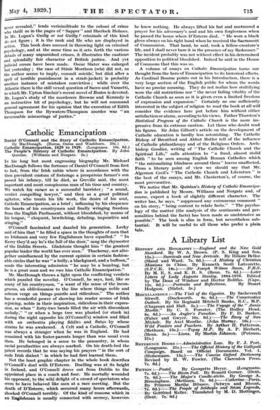• then prevalent custom of fosterage a ProspeiroUs fanner's son
Algernon Cecil's " The Catholic Church and Literature " is passed his infancy, till he died, as ' Greville said, the most the best of the essays, and Mr. Chesterton's, of course, the important and most conspicuous man of his time and country. most provocative.
said of him that he filled a space in the thoughts of men that tale. Irishm he knew nothing. He always lifted his hat and murmured a prayer for his adversary's soul and his own forgiveness when he passed the-house where D'Esterre died. " He wore a black glove always on biS right hand when he received the Sacrament of Communion. That hand, he said, took a fellow-creature's
• life, and I shall never bereft in the presence of my Redeemer."
• The incident probably was mit without effect in his determined opposition to political bloodshed. Indeed he said in the House - Of Commons that this was so.
• A volume of essays on Catholic Emancipation turns our thought from the hero of Emancipation to its historical effects. - As Cardinal Bourne points out in his -Introduction, there is a very large section of the English public for whom the words have no precise meaning. They do not realize how stultifying were the old restrictions nor " the never failing vitality of the Catholic Church as soon as it is given even a limited freedom - of expression and expansion." Certainly no one sufficiently interested in the subject of religion to read the book at all will consider the evidence here put before him without either satisfaction or alarm, according to his views. Father Thurston's Statistical Progress of the Catholic Church is the more im- pressive from its extreme caution. Let those who doubt read Catholic Emancipation • his figures. Sir John Gilbert's article on the development of•. . . Catholic education is hardly less astonishing. The Catholic By 311acDonagh. (Burns, _Oates and Washburn. 20s:) = of Catholic philanthropy and of the Religious Orders. Arch-
Quinlan. (Williains and Norgate. • 5s.) - • • . Spiritual Life," calls attention to " a fixed, almost stolid
O'Connell fascinated and dazzled his generation. Lecky tantia_ I. ft will be useful to all those who prefer a plain






















































 Previous page
Previous page